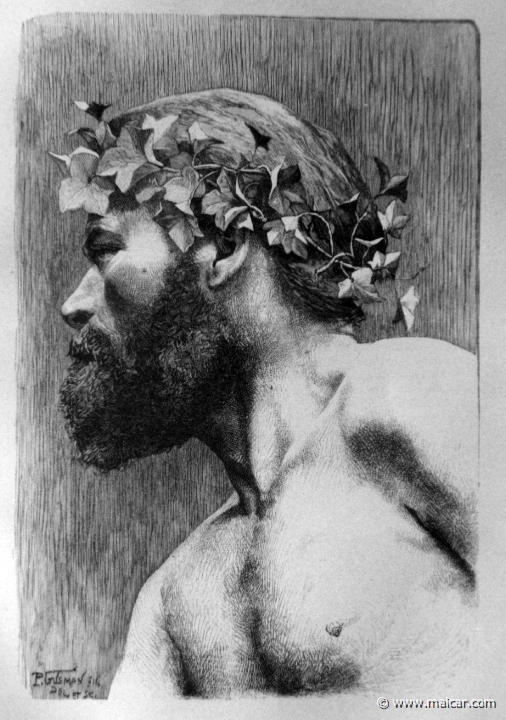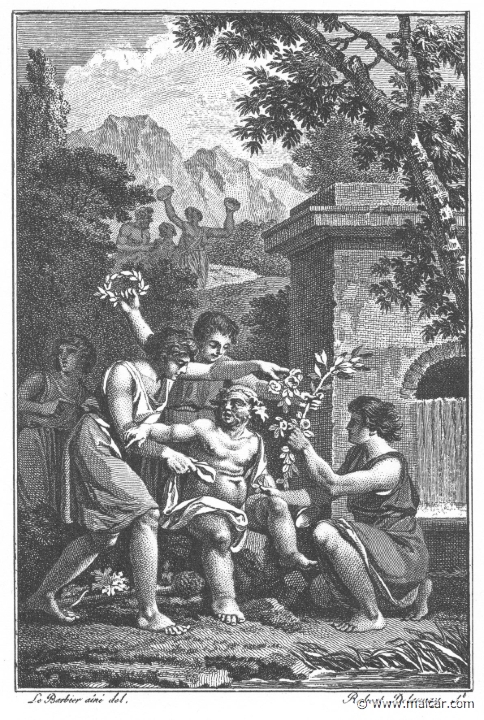|

|
Silenus. 2904: Wood-engraving by Pierre Gusman. Philip Gilbert Hamerton, Man In Art (Macmillan and Co., London & New York 1892).
|
|
|
"Are you not a piper? Why, yes, and a far more marvellous one than the satyr. His lips indeed had power to entrance mankind by means of instruments; a thing still possible today for anyone who can pipe his tunes: for the music of Olympus' flute belonged, I may tell you, to Marsyas his teacher. So that if anyone, whether a fine flute-player or paltry flute-girl, can but flute his tunes, they have no equal for exciting a ravishment, and will indicate by the divinity that is in them who are apt recipients of the deities and their sanctifications. You differ from him in one point only—that you produce the same effect with simple prose unaided by instruments." (Alcibiades to Socrates. Plato, Symposium 215c).
"The man who does not enjoy drinking is mad." (Silenus. Euripides, Cyclops 169).
A Satyr: Did you capture Troy and take Helen prisoner?
Odysseus: Yes, and we sacked the whole house of the sons of Priam.
A Satyr: Once you had caught the girl, didn't you all then take turns banging her, since she takes pleasure in having more than one mate? (Euripides, Cyclops 180).
|
|
Silenus, although an old and cheerful drunkard,
is the adviser and instructor of Dionysus 2, and is
said to have greatly contributed to the god's
achievements and Fame.
SILENS and SATYRS
Silenus is one of the SATYRS, the oldest of which are sometimes also called SILENS. Therefore, some say "a Silenus" as they would say "a Satyr," and they may say "Marsyas the Silenus" as well as "Marsyas the Satyr". The SATYRS are the
horned attendants of Dionysus 2 who afford delight with their dancing and singing. Sometimes no horns are visible or else appear as very small, a circumstance that probably depend on the imagination of the artists depicting them, or on that of those seeing them. Because the SATYRS were sometimes represented in drama, those plays in which the chorus was composed by them were called "Satyric Dramas," and the actors experienced the pleasure of dancing in a wild manner, and behaving in an unrestrained way.
Savage islanders
Others have asserted that SATYRS were the
inhabitants of the islands called Satyrides, being
notorious for outraging foreign women. Since these SATYRS were utterly wild men living in certain Mediterranean islands in the vicinity of Italy, the sailors used to do whatever was necessary in order to avoid them. But sometimes, not having any other choice, they were obliged to put in at what they named the Satyrides islands. According to these sailors (but sailors love to
invent tales), the SATYRS had tails upon their flanks almost as long as those
of horses. That was not so bad; much worse was
that, when they caught sight of visitors, they ran
down to the ship uttering loud sounds, and having
come on board, they immediately assaulted the
female passengers. This behavior caused such a
panic in the crew that on one occasion the sailors
decided to get rid of these savages by casting a
foreign woman to the island for them to outrage in
the most shocking manner, while they sailed away.
Drunkenness is the best friend
But the SATYRS or
SILENS who were the companions of Dionysus 2 are known for other deeds. Silenus' best friend was no doubt Drunkenness;
for in his view nothing was better than wine in great quantities.
Silenus' love of wine knew
no limits, and that is why King Midas could easily capture
him, for he mixed wine to the water of a spring, and the entranced Silenus would not leave the place. Yet Silenus and the others like him could not go
on drinking indefinitely, as they had wished; for
they were a mortal race, as it may be deduced from
their graves, found both in the land of the Hebrews
and at Pergamus. And for such a race, both delights
and sorrows come one day to an end.
Silenus' dreams of glory
Silenus tells (but perhaps he dreamt) that he
protected the childhood of Dionysus 2 from the
wrath of Hera, and later
assisted him during the battle of the OLYMPIANS against the GIANTS, killing the giant Enceladus 2, who otherwise is said to have been annihilated by Athena,
when she threw the island of Sicily on him.
Prisoner of the Cyclops
Later, chasing the pirates that had attacked Dionysus 2, Silenus
came to the island where Polyphemus 2 lived.
There he became the prisoner and servant of the
Cyclops, and was still there when Odysseus, blown
off-course by sea-storms, came to the island and
took the eye of Polyphemus 2.
Midas' festival in his
honour
After Orpheus' death, Dionysus 2 came to Phrygia (some say in his
way to India), being as usual followed by SATYRS and MAENADS. It was then that Silenus, burdened with Old Age and wine, went lost, being
captured by peasants, who bound him with wreaths,
and led him to King Midas. Midas, who also had a
vast experience in the matter of wine, rejoiced when
Silenus—whom he already knew from past
revels—was brought to him, since the occasion
provided an occasion for merry celebration. It is
told that Silenus and the king feasted for ten
continuous days and nights, after which the old man
was returned to his foster-child Dionysus 2.
|

|
02089: Silenus taken by the Phrygians. "But Silenus was not there. Him, stumbling with the weight of years and wine, the Phrygian rustics took captive." (Ov. Met. 11.90). Guillaume T. de Villenave, Les Métamorphoses d'Ovide (Paris, Didot 1806–07). Engravings after originals by Jean-Jacques François Le Barbier (1739–1826), Nicolas André Monsiau (1754–1837), and Jean-Michel Moreau (1741–1814).
|
|
Conversation between Midas and Silenus
Midas and Silenus did
not spent their time together just feasting, but
also had a long conversation. In it Silenus was the
tongue and Midas the ear,
which is appropriate since Silenus, though less
illustrious than a god, is nevertheless an immortal
and therefore superior to any man however rich or
powerful. At the same time Midas was a good listener,
although one may think that he not always had the
judgement to sort out properly what he had been
listening to.
Silenus first described the world, saying that
Europe, Asia and Libya (Africa) are islands
surrounded by the ocean and that the only continent
is the very large one surrounding the outside of
this world. This continent, he explained, supports
large animals and men whose lives are twice as long
and who themselves are twice the size of those
living in this world.
He added that among the many large cities there
are two very different from each other: one called
Warlike and the other Pious.
The citizens of Pious, he said, enjoy both peace
and wealth, obtaining the fruits of the earth
without needing to cultivate and without employing
the plough and oxen. They are free of disease and
they are happy, and they are so just that even the
gods frequently visit them.
On the other hand, the citizens of Warlike are always fighting and opressing their neighbors. They control many nations and they are not less than twenty million. It may happen that they die of disease, but for the most part they meet their death in battle wounded by wooden clubs or stones since they cannot be harmed by iron.
They possess so much gold and silver that for
them these metals have less value than iron has to
us. On once occasion, Silenus, said, they invaded
our islands (Europe, Asia and Libya) with an army
of ten million, reaching the realm of the
Hyperboreans. But when they learned that these were
the richest of all peoples, they felt contempt for
them because of their inferior wealth, and decided
not to proceed any further with their invasion.
Silenus also talked of the Meropes, owners of
many cities, saying that on the edge of their land
there is a place named Point of No Return, this
being a chasm which is neither dark nor light but
is covered by a red haze. In this place, Silenus
continued, there are two rivers, one named Pleasure
and the other Grief with trees along the banks of
both that bear fruit of different qualities. Those
that grow along the river of Grief cause anyone who
eats them to shed so many tears that he melts into
laments for the rest of his life until he dies. But
he who tastes from the trees growing by the river
Pleasure loses all his desires, forgetting even his
previous love, if he had one. Then he is slowly
rejuvenated, going through the stages of life in
reverse order and dying after becoming an infant.
It is not known whether King Midas found these tales
entertaining nor whether he gave them credit or
not, but posterity was not impressed.
|